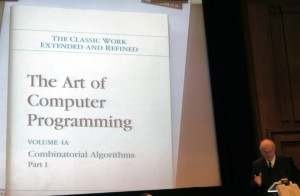 OK, this is somewhat less relevant to CEP than normal: this week I attended the 13th BCS Turing Lecture by Prof Donald Knuth who’s biggest connection to CEP is that he is an associate of Prof David Luckham at Stanford University (Prof Knuth explaining “of course I know David” when I asked). This was however not so much a lecture as an extended Q&A session, with all topics taken! Highlights were:
OK, this is somewhat less relevant to CEP than normal: this week I attended the 13th BCS Turing Lecture by Prof Donald Knuth who’s biggest connection to CEP is that he is an associate of Prof David Luckham at Stanford University (Prof Knuth explaining “of course I know David” when I asked). This was however not so much a lecture as an extended Q&A session, with all topics taken! Highlights were:
- on program code re-use: of course re-use is good, but Donald found he has 20 books open on his desk when developing!
- on future programming languages: new languages are not golden bullets; there is no “optimum language”
- favorite font: LITHOS, as seen in a book at the Victoria and Albert museum recently as well as on some buses in Amsterdam…
- on the need to start archiving software source code: the Mountain View Computer History Museum is starting to do this… and as a side note, Donald thought it a shame that the focus in Computer Science is moving to economics rather than science…
- the demise of society’s respect for science, such as the dismissal by many of climate change science: reminds us of Jevon’s Paradox, where coal consumption soared after the steam engine was made more efficient due to increased uses…
- why title his series of books The Art of Computer Programming or TAOCP – rather than The Science of Computer Programming: a science implies something that can be programmed into a computer, but good programming cannot be done by computers yet!
Indeed, on the latter point, it seems that most IT today is about simplifying rather than optimising: I doubt many of us business solution developers study TAOCP to do our jobs. But maybe TAOCP is better targeted at tool developers, not application developers?
Meanwhile, most of the CEP community is hoping for a similar situation to Jevon’s Paradox on the useage of CEP: if we continue to make CEP more efficient for our current use cases, it will start being used in others! Indeed, I would argue that is already happening…





